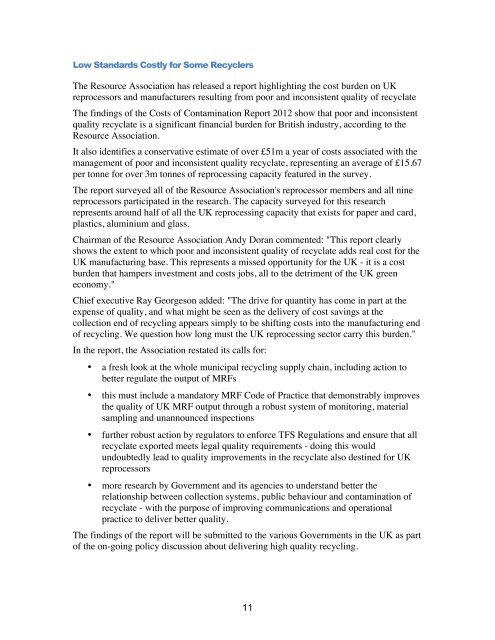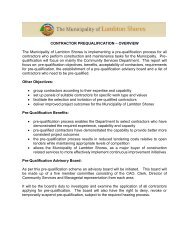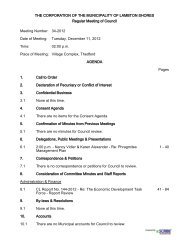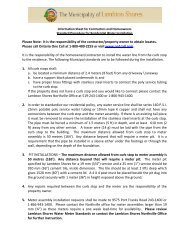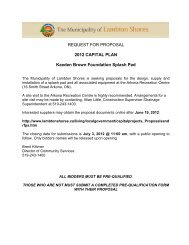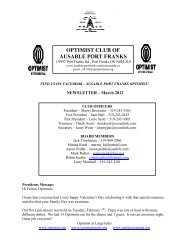View - The Municipality of Lambton Shores
View - The Municipality of Lambton Shores
View - The Municipality of Lambton Shores
Create successful ePaper yourself
Turn your PDF publications into a flip-book with our unique Google optimized e-Paper software.
Low Standards Costly for Some Recyclers<br />
<strong>The</strong> Resource Association has released a report highlighting the cost burden on UK<br />
reprocessors and manufacturers resulting from poor and inconsistent quality <strong>of</strong> recyclate<br />
<strong>The</strong> findings <strong>of</strong> the Costs <strong>of</strong> Contamination Report 2012 show that poor and inconsistent<br />
quality recyclate is a significant financial burden for British industry, according to the<br />
Resource Association.<br />
It also identifies a conservative estimate <strong>of</strong> over £51m a year <strong>of</strong> costs associated with the<br />
management <strong>of</strong> poor and inconsistent quality recyclate, representing an average <strong>of</strong> £15.67<br />
per tonne for over 3m tonnes <strong>of</strong> reprocessing capacity featured in the survey.<br />
<strong>The</strong> report surveyed all <strong>of</strong> the Resource Association's reprocessor members and all nine<br />
reprocessors participated in the research. <strong>The</strong> capacity surveyed for this research<br />
represents around half <strong>of</strong> all the UK reprocessing capacity that exists for paper and card,<br />
plastics, aluminium and glass.<br />
Chairman <strong>of</strong> the Resource Association Andy Doran commented: "This report clearly<br />
shows the extent to which poor and inconsistent quality <strong>of</strong> recyclate adds real cost for the<br />
UK manufacturing base. This represents a missed opportunity for the UK - it is a cost<br />
burden that hampers investment and costs jobs, all to the detriment <strong>of</strong> the UK green<br />
economy."<br />
Chief executive Ray Georgeson added: "<strong>The</strong> drive for quantity has come in part at the<br />
expense <strong>of</strong> quality, and what might be seen as the delivery <strong>of</strong> cost savings at the<br />
collection end <strong>of</strong> recycling appears simply to be shifting costs into the manufacturing end<br />
<strong>of</strong> recycling. We question how long must the UK reprocessing sector carry this burden."<br />
In the report, the Association restated its calls for:<br />
• a fresh look at the whole municipal recycling supply chain, including action to<br />
better regulate the output <strong>of</strong> MRFs<br />
• this must include a mandatory MRF Code <strong>of</strong> Practice that demonstrably improves<br />
the quality <strong>of</strong> UK MRF output through a robust system <strong>of</strong> monitoring, material<br />
sampling and unannounced inspections<br />
• further robust action by regulators to enforce TFS Regulations and ensure that all<br />
recyclate exported meets legal quality requirements - doing this would<br />
undoubtedly lead to quality improvements in the recyclate also destined for UK<br />
reprocessors<br />
• more research by Government and its agencies to understand better the<br />
relationship between collection systems, public behaviour and contamination <strong>of</strong><br />
recyclate - with the purpose <strong>of</strong> improving communications and operational<br />
practice to deliver better quality.<br />
<strong>The</strong> findings <strong>of</strong> the report will be submitted to the various Governments in the UK as part<br />
<strong>of</strong> the on-going policy discussion about delivering high quality recycling.<br />
11


